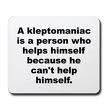Kleptomania is an obsessive – compulsive disorder or also known as “compulsive theft behavioral disorder”. It is a manifestation of a larger psychiatric entity.
While the legal consequence of being caught stealing is the same for all thieves, the motive of a kleptomaniac is gratification in the act of stealing, not for economic benefit.
As we have known, everyone has its own rituals, superstitions and habits. These are normal “adjustments” to make one’s life manageable and even pleasurable.
Once these behaviors become uncontrollable and seems to take over one’s thoughts and feelings, there must be a reason to suspect a brain malfunction called obsessive- compulsive disorder (OCD).
It is not a person’s fault or the result of a weak, spineless and unstable personality. Investigators are proving that in OCD, information processing in the brain suffers as the communication between parts of the brain (cortex and basal ganglia) fails.
Serotonin, a neurotransmitter or chemical messenger in the brain is insufficient in OCD patients.
Obsession are “thoughts, images, impulses” that occur over and over to a point that a person feels out of control. What’s significant is that there is recognition that these obsessions are a nuisance and do not make sense.
Consequently, the person is disturbed and overwhelmed. Compulsions are intimately connected to obsessions because these are the acts performed to make obsessions go away.
The following criteria and symptoms shall help us identify if one has kleptomaniac tendencies which are:
— Recurrent failure to resist impulses to steal objects that are not needed for personal use or for their monetary value.
— Increasing sense of tension immediately before committing the theft.
— Pleasure, gratification or relief at the time of committing the theft.
— Stealing is not committed to express anger or vengeance and is not in response to a delusion or hallucination.
Obviously, most thieves don’t exhibit any of the above traits.
Its treatment – while family members and love ones can form a strong support group, it is necessary to see a psychologist or a psychiatrist.
Two effective treatments have evolved: Cognitive behavioral psychotherapy and medications with Serotonin reuptake inhibitors (SRIs).
In the acute treatment phase, the therapist aims to end a current episode of OCD. In the maintenance phase , the goal is to prevent or minimize further OCD occurrences.
These may be accomplished through education (of both patient and family members), psychotherapy and medication.
OCD is a waxing and waning disorder and so response to treatment maybe difficult to gauge. However, patients are kept on medication for at least one year and if OCD episodes are noted to be few and far between , the medicine is tapered off.
Now we know the strict criteria for kleptomania, all others are just plain thieves.
